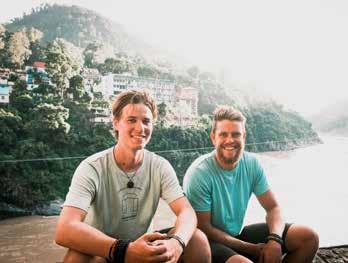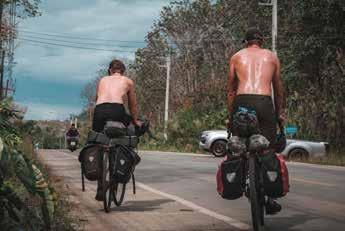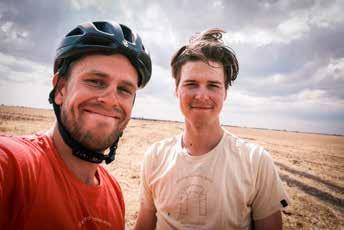
8 minute read
Southeast Asia stories from the back of a bike
“The best days were actually the most exhausting ones. Those days you just appreciate everything more. The food would taste better. You are simply too exhausted to think about anything.”
Text: Miabell Mallikka Photos: Curious Pedals
Vallu and Alvis, the two Finnish friends who cycled from Helsinki to Singapore, has shared their stories going through Southeast Asia on a bike with ScandAsia.
The two have spent a lot of time reflecting on their journey, writing in their diaries and studying the places they’ve been cycling through. They both agree, that the region in many ways were very easy and approachable as a cyclist.
“The food is good. The roads are good. People are nice and there are hospitals everywhere as well as Wi-Fi,” Vallu says.
The biggest challenge going through the Southeast Asian region, was according to the boys, the heat.
“There were different challenges in every region, but in Southeast Asia the constant challenge was definitely the heat,” Alvis says.
But besides the mutual challenge of the heat, the different countries had the two boys face different encounters.
Vietnam
In Southeast Asia they started out in Vietnam, where the first week was none stop rain.
“It was still pretty hot, but it was constantly raining. We had planned on camping a lot, but we couldn’t,” Vallu shares.
All of their things were constantly wet and quickly started to get moldy. The two had to spend a lot of time and energy trying to keep their gear in a decent condi- tion. They would have to stop up every time there was a pause in the rain to find a sunny spot and lay out their stuff to dry.
“Even though our bags are mostly waterproof, they would still get moist on the inside. We would have to empty everything out quite often to wash it and try to make it dry, but it would never get to dry properly, cause the sun would never be there for long,” Alvis then adds.
The missing visa
“One crazy story was, I never got my Vietnamese visa. I then had to do a visa run in the rain,” Vally suddenly remembers.
That day, the boys had biked a hundred kilometers. The place where Vallu had to turn in his visa application, was in the opposite direction of the border. He therefor had to rent a motorbike to get there.



His visa went through, but before he managed to reach the border it was around 10pm. He ended up spending almost seven hours on a motorbike, after a long day of cycling.

“It was raining the whole time, so I could either put my visor down, and then I couldn’t see anything, or I could take the visor off, but then all the rain was coming in my eyes. I had no choice but to drive really slowly,” he shares.
Somewhere along the way, Vallu’s passport got wet in the rain. Knowing that Thailand is super strict about passport policy, he contacted the Finnish embassy in Hanoi to see, if he would have to return to Hanoi to retain a new passport.
Eventually, he decided to order a new passport in Finland, and have it delivered to his parents’ home. Then one of his friends back in Finland send it to a Vietnamese guy the boys knew in Ho Chi Minh city. Here Vallu managed to pick it up, before they went to cross the border to Cambodia.

“When we entered Cambodia, I had to do a “secret passport swap.” I exited Vietnam with my old passport, but then at the next counter, I took out my new passport and they stamped me in. The whole time I was just begging “please don’t check for my Vietnamese stamps,” but thankfully they didn’t,” he tells with relief in his voice.
Cambodia

“Of all the countries in Southeast Asia, I think, Cambodia was the most distinct,” Alvis resonates as we talk.
“The infrastructure was terrible. The roads were in a really bad condition compared to what we had gotten used to. But at the same time, the place has such a rich culture,” He adds.
One of the first things the boys noticed was, that there wasn’t a lot of old people in the country. A fact they believe has to do with the horror of Khmer Rouge regime.
“We’ve both tried to read books about the coun- tries we’ve gone through. One of those I’ve read was “first they killed my farther.” It’s a pretty heavy book to read, but that way you get the insides into the places. It also changes your perception of the countries. This one made us aware of just how recent this genocide was,” Vallu says.
“We have probably read about six books each on the places we’ve been. But during our time in Southeast Asia, we didn’t do as much reading, since we were joined by Greg. We then spend more time socializing and getting to know each other than we did in the beginning.”
Greg joined the two friends in Bangkok in January and started helping the boys documenting their achievement.

Thailand
“For me my favorite country was probably Thailand. Except for the super touristy places, like some of the islands we went to,” Alvis says with a lot of enthusiasm.
The three spent a day in Koh Phi Phi. An island the two characterize as just one big tourist trap and party place.
In the hope of escaping the many tourists, they went to the other side of the island. Here they managed to get the entire beach to themselves.
“When you bike, you have the opportunity to find some of those places close to where the tourists go, where you’ll end up having the whole place to yourself,” they share.

In Phuket, they went to a park by a big lake, just north of the touristy place.
“It was just such a beautiful national park. They did these boat tours around the lake. The boats were a bit too expensive for us though, so we decided to go and have our own adventure,” Vallu says.
The boys left their bikes and found a remote place with some small abandoned huts by the crystal-clear lake.
“We ended up having this amazing, remote experience, all by ourselves. We got some take-away food from the hardware store and just listened to music. Then we went swimming and made up our own games. It was just one of the best experiences,” both of them agrees.
“I think it’s a really good story to sum up our experience. These quiet places, where not much is happening. At these places we got to create our own fun. It’s amazing how much fun you can have with just the smallest things,” Vallu shares while reflecting on their journey.
Malaysia
“When it comes to the different places, a lot is made up by the people we meet and communicate with and the community’s we got to experience,” Vallu states.
In Malaysia they got to experience this small surfer community, which according to Vallu, blew him away.
“It was very unique to experience a place like this, in such a conservative country. It had such a vibrant vibe and communal atmosphere. There was the most amazing hospitality. People greet you like they know you and they treat you like a friend instead of just a tourist or a stranger,” he tells. His eyes beaming by the memory.
The locals would let them put up their tent in their bag yards and offered them to use their showers for free.
“They don’t want anything from you. They just want you to feel welcome. Even just by these small gestures,” he adds and makes it clear, that Malaysia was very special to him.
“On the road, we were cycling by the highway, when this car passed us. We didn’t notice it at first. It was just another pickup truck. Then a few hundred meters ahead of us, the driver parks his car and gets out with three cans of soda, which he hands us as we pass by,” Alvis adds.
“Exactly,” Vallu says. “These small gestures makes a massive different on your perception of a country,” he then adds.
“It may have been a small deed, but it made our week,” Alvis notes.
But biking through Malaysia had its challenges
With only 300 kilometers left, Alvis’ bike broke down and he ended up having serious problems with the back wheel of his bike.


“One day, I had to get off and try to fix it seven times,” he adds.
On that day, they had planned to drive 200 kilometers, but they only managed to bike for about 40 kilometers before Alvis’ wheel popped.
“I fixed, but soon it would pop again. That happened four times in a row,” he shares with a hint of frustration in his voice.
The boys had just left the city when the wheel popped. It quickly became clear, that he would have to take it to a bike store.
“I had to hitchhike back to town to have it fixed. Since we had planned to go 200 kilometers that day, we agreed that Vallu and Greg would continue to the next city, while I would go fix the bike. I would then meet up with them later on,” Alvis tells.

He did get the bike fixed and he did manage to catch up with the rest of the small group, but soon after, his bike would break down again.
At that point it was clear, that they would not be able to do the 200 kilometers that day.
Lost in the dark
It was starting to get dark, and the boys were stranded in a remote area in the Malaysian countryside.
“We were 10-15 kilometers away from this campsite we had our eyes on. We then agreed that Vallu and Greg, once again, would go ahead and set up the camp, while I would stay behind and fix my bike.”
Without thinking much about it, Vallu and Greg took off to set up the camp, while Alvis stayed back to fix his bike, yet again.
“The only problem was, that the tiny screw on the ventil of my only good tire fell off, and I couldn’t find it,” Alvis shares.
The sun went down. It got all dark and moist and Alvis had no way of fixing his bike without the screw. He then had to call Vallu and tell them, that he was unable to fix the bike.
“And he had our dinner,” Vallu adds.
Alvis was then forced to start walking towards the closest houses which was three kilometers away. After dragging his bike for several kilometers in the dark, he managed to reach a house, where he was able to get a ride to the campsite.
Don’t fall into routines and comfort
It was clear, that the stories would quickly make the boys reflect on what they’ve gained from the last 8 months. Spending almost every day on their bikes in the effort to reach their goal of biking from Helsinki to Singapore.
“The best days were actually the most fatiguing ones,” Vallu says.
“Those days you just appreciate everything more. The food taste better. You are simply too exhausted to think about anything. As soon as we would stay in a city for too long, we would start falling into the trap of overthinking things,” he adds. Then he shares a note he made to himself during the trip:
“Finland is such a special country where everything works extremely well and the quality of life is extremely high. A person have to be careful, cause it’s easy to fall into routines and comfort. You have to remember to continue challenging yourself and don’t fall into the traps of comfort and pleasure.”








